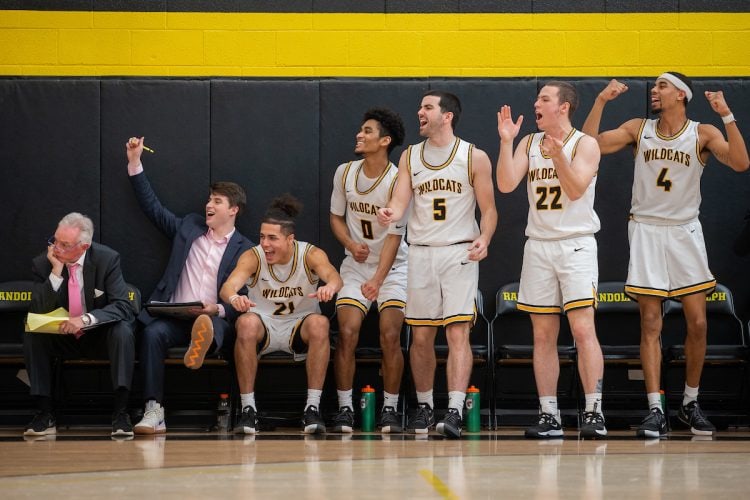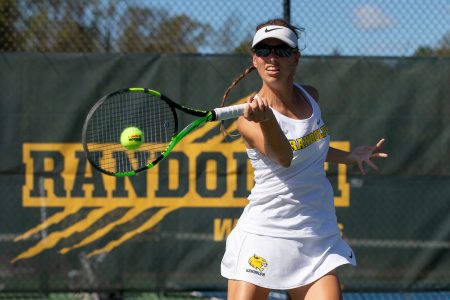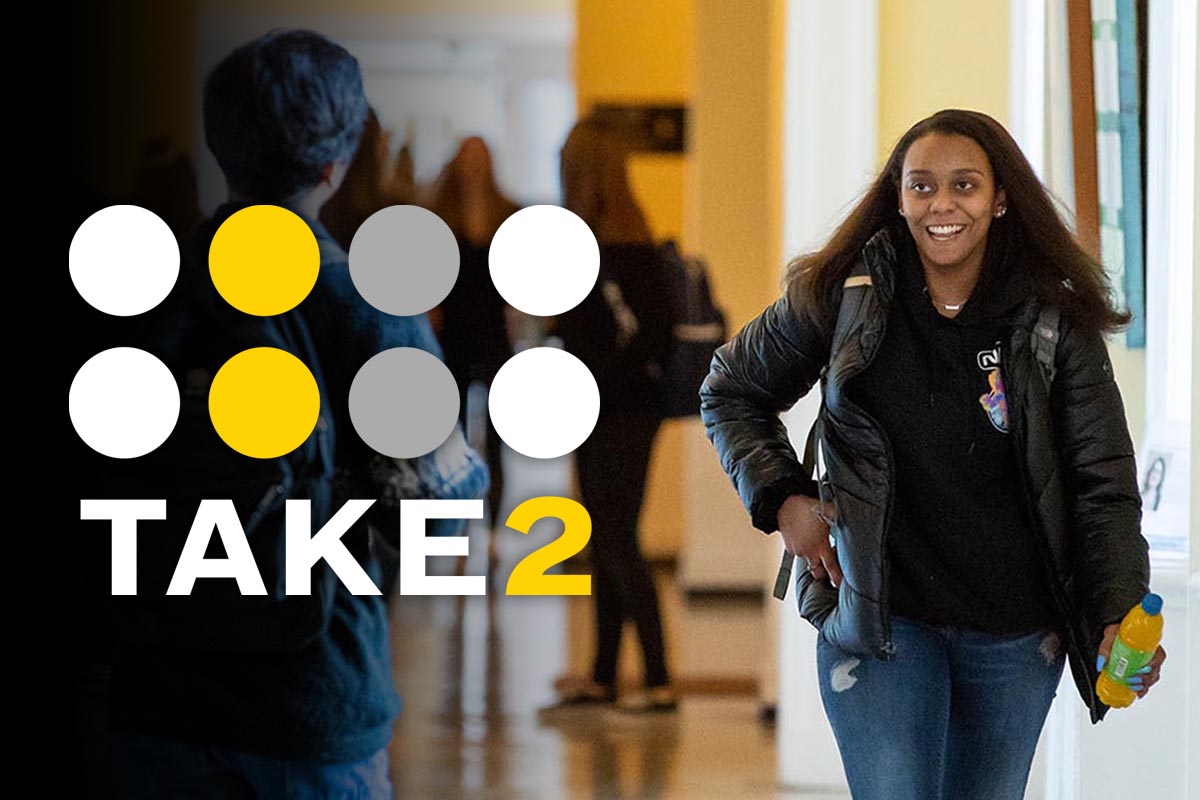Randolph launches new Master of Arts in Coaching and Sport Leadership, the first of its kind in the ODAC

Ben Roberts ’20, second from left, is among the Randolph graduates enrolled in the new Master of Arts in Coaching and Sport Leadership program. He will be working as a graduate assistant for the men’s basketball team while completing his degree.
When it comes to coaching, there is no one right way to lead. But the best leaders know it’s about forming relationships with your players and building a team around that.
“You can’t teach one skill to 10 people and expect them all to understand it the same way,” said Meghan Halbrook, a sport and exercise studies professor and director of the new Master of Arts in Coaching and Sport Leadership (MACSL) program at Randolph.
“I think historically, we looked at coaching as, ‘I’m the leader and everyone is going to adhere to what I say.’ But what we know, and what research tells us, is that this method is not really a transformational leadership style,” she said. “Transformational leadership is getting to know your athletes as people, what makes them unique, and learning how to motivate them based on who they are.”
That individualized approach is among the hallmarks of Randolph’s MACSL program, which begins its first cohort today.
The intensive one-year program—the only of its kind in the Old Dominion Athletic Conference—will be taught over five seven-week sessions, one in the summer and two each in the fall and spring.
Students can choose between two tracks: One that is completely online, and the other that is more of a hybrid approach, offering a mix of online and in-person instruction. No matter the option, students will be taking the same classes and learning the same content.

Ashley Schmitz ’20 is enrolled in the Master of Arts in Coaching and Sport Leadership program, and is utilizing her fifth year of eligibility to continue playing tennis for the WildCats.
“Essentially the people who are on campus are going to be participating in sports or they’re going to be graduate assistants, so doing that hybrid model allows them more flexibility,” she added.
While the first session will be completely online because of COVID-19, Halbrook is hopeful on-campus classes will be able to resume during the fall session.
The curriculum includes courses in coaching psychology, research methods, coaching techniques and theories, sport administration, conditioning and safety principles, and sport media and technology, to name a few.
Halbrook said they formatted the courses to match national standards as they work toward becoming an accredited program.
“There’s a whole set of national standards that have been released, 42 standards for sport coaches that essentially make a quality coach,” she said. “So we looked at those and chose classes where those standards could be taught in a way that was effective and made sense. We are a liberal arts school, and I tried to put together a curriculum that was very holistic and covers a lot of different angles.
“We are trying to match the standards, and we’ve done that, but we’re also trying to stay true to Randolph.”
In some programs, for example, classes such as coaching psychology, coaching methods, and sport sociology are all lumped together. At Randolph, they are three separate courses—each relevant to future coaches, Halbrook said.
“Sport is a microcosm of society. Whatever is happening in society is happening in sport, and we have to be able to address that,” she said. “It’s important to have an awareness of the types of athletes who are participating in sports—athletes of different races or ethnicities or athletes who are LGBTQ. The program is very much focused on inclusive coaching practices. Not only are they learning about sport history, but they’re also learning about some of the ethical dilemmas they might be put in as coaches, and how they can approach them, not only for themselves but for their athletes.”
Another course will focus on sport media and technology, covering how sport is portrayed in the media as well as how coaches can leverage technology.
“We have so much at our disposal that we can use to be better coaches, or to provide ourselves with more information than what we might have had historically,” Halbrook said.
Some examples include having players wear devices that can track how far or how fast they are running as well as to monitor their heart rates.
“We can actually see if players are starting to get fatigued and what that might mean,” she said. “This can be really helpful with identifying starting line-ups, or deciding when you should be amping up practices and when you should be giving them rest. The idea of rest is often almost seen as a negative thing in sport, but rest is essential in order to perform at our best.
“Finding different types of technology and how to utilize those in coaching is a really fun and different way of approaching the profession,” she added.
With a small incoming cohort, Halbrook said they’re excited to personalize the content for students, who have experience with a wide range of sports.
Most are recent college graduates, while others have been working as assistant collegiate coaches and want to be ready for a head coaching spot when the opportunity arises.
In addition to taking classes, students also must complete 42 hours of practicum work during each seven-week session—adding up to more than 200 hours of hands-on, real-world experience by the time they graduate.
For some, it might be where they’re already working. Others can find opportunities in their communities, whether it’s shadowing an athletic director or helping out with a high school or youth team.
The goal through it all is for coaching to be recognized as a profession, Halbrook said, and not just something that’s done on the side or as an afterthought.
“It’s an international profession,” she said. “We see other types of leadership programs like organizational leadership and nonprofit leadership. But coaching and sport leadership education just hasn’t gained as much of a footing here in the U.S. as it has in other countries. We’re actually pretty far behind as far as standards and organizational policies around sport leadership or coaching education. We’re trying to play catch-up, and the creation of these types of programs is really one of the main steps.”
More information about the program can be found at https://macsl.randolphcollege.edu.
Tags: coaching, coaching and sport leadership, Master of Arts in Coaching and Sport Leadership, masters degrees, Meghan Halbrook, sport and exercise studies
